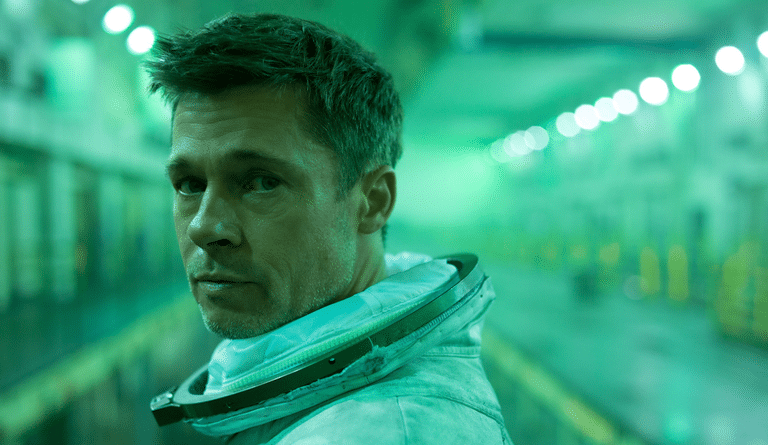

Ad Astra sees James Gray return to traversing emotional barriers between a father and his son after his under-loved The Lost City Of Z– a film set in the Amazon, to a space drama that is as expansive as it is intrinsic. It’s about a son voyaging through space to reach his distant father- his towering legacy and absence while ruminating over his own choices in life.
Like all great space films, the immense, engulfing void of darkness here acts as a metaphorical backdrop to one’s piercing and haunting questions. These might be rooted in personal history but are nevertheless universal. Contact, Interstellar, Arrival are some recent Sci-Fi’s that hinge on themes of parenthood, and Ad Astra joins these movies through its exciting combination of action and introspection, although with lesser grandeur, black holes or wormholes.
RELATED: THE BEST HOLLYWOOD MOVIES OF 2019
Brad Pitt has long embodied the idea of a character actor trapped in a leading man’s body. It was quite a shock seeing Brad shift from an animated, chill-bruh turn in Once Upon A Time… In Hollywood to a stoic, repressed and resigned performance here. He plays Roy, a member of America’s “Space Command.” The first time we come across his technician is when he is fixing a space antenna.
This enormous structure extending from the surface to the sky is one of the many fresh extra-terrestrial set-pieces where one can genuinely appreciate Hoyte Van Hoytema’s camera prowess and Kevin Thompson’s production design. It’s a visually arresting feat of human innovation but doesn’t last for long, as Roy plummets towards earth as a result of a massive cosmic surge emanating from deep space that destroys the antenna. He is calm throughout, as his BPM never goes above 80. However, the folks back home inform him of his father’s existence and possible involvement in the occurrence and send him out to Neptune (points for planetary representation) to convince him otherwise, something we later realize was bound to increase this number.
What follows is a trip to the moon, now with a Subway for your inter-galactic hunger pangs; it seems like humanity has leaped forward in space exploration, and capitalism has closely followed. An incredible Mad Max-esque sequence involving lunar buggies ridden by moon-pirates provides a window into the director’s ability to offer fresh takes on spatial action, but that is not what he wants to achieve with this movie. From here, Roy travels to Mars, and while on the way, must take a short detour to attend a distress signal from another spacecraft, a sequence specifically designed to highlight Roy’s pensiveness and emotionless state.
On Mars, he tries to communicate with his father, but to no avail. With the help of Ruth Negga’s Helen, Roy decides to take matters in his own hands and pilots the ship destined to deliver a nuclear payload to his father’s location. He eventually does so alone, as the rest of the crew suffer ill fates in the process. The son suffers the sins of his father, and the parallels between the two male leads now become quite unmissable. One must also note the pitch-perfect casting of Tommy Lee Jones as Clifford, the father. His grumpiness and indifference towards humanity seem to be inspired by a perpetual disdain in his actual life, and he does justice to his character.
One theme that comes out from the proceedings of the film is that of the search for a divine entity, a search for a higher being (Clifford) who has abandoned us mortals (Roy). He finally arrives near Neptune, only to find his father has no interest whatsoever in coming back. After a brief struggle, he asks Roy to let go; let go of him, along with his conceptions of who he is.
“Now you see, we’re all we’ve got,” Roy says, and that the higher truth or transcendence isn’t out there near Neptune, but back home, with friends and family. There is comfort in realizing that whatever’s out there is beyond our physical reach and comprehension. There are humility and gratification in smallness.
RELATED: THE BEST SCI-FI MOVIES ON NETFLIX
Towards the end, Jodie Foster’s character in Contact says, “If it’s just us, seems like an awful waste of space.” It is not a stretch to say that our inability to focus on those who are close to us- choosing to look outwards, to the stars, when you must look within and around- is an even more significant loss.
Images via 20th Century Fox
Directed by Rory Karpf, Grace Point crafts a tense, wilderness-set thriller that centers on a… Read More
BitterSweet, the feature directorial debut of Steven Martini, is a romantic dramedy that walks the… Read More
Eternal Code (2019), written and directed by Harley Wallen, is a sci-fi thriller that delves… Read More
Regarding Us is a drama-comedy that traces the delicate intersections of identity, faith, and found… Read More
A world where no one can go outside and everyone lives alone in tiny rooms… Read More
The Devil’s Left Hand brings together elements of horror, mystery, and thriller under the direction… Read More
We use cookies, just to track visits to our website, we store no personal details.
View Comments